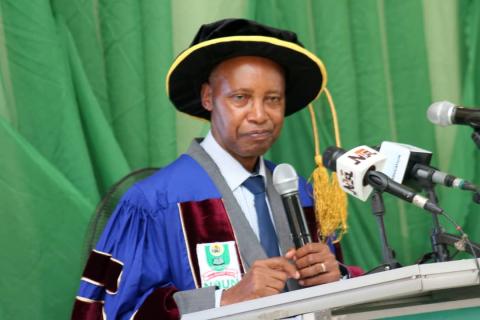
The Vice-Chancellor of the Open University of Tanzania, (OUT), Prof. Elifas Tozo Bisanda, has advocated for the inclusion of vocational education in universities’ curriculum for undergraduates across the African continent.
Bisanda, who delivered the 13th Convocation Lecture of the National Open University of Nigeria (NOUN) on Friday, April 12, 202, at the university headquarters, Abuja, said African undergraduates should focus on developing their vocational abilities that would be beneficial to their respective countries and economies.
While delivering the lecture with the title: “Is Western Education Still Relevant to Africa?”, Bisanda highlighted the need for Africa to see how the Western nations are developing while Africa remains poor, noting that Africans have been made to focus on the theory aspect of studying instead of innovating and practising what they learn, thereby creating nothing for the benefit of the nations.
A Professor of Engineering, he added that “almost every country, over the past ten years, has undergone some kind of reform in its education system.
“In Tanzania, we have just finished the process of reforming our education system, that puts more emphasis in practical skills than theory. Why are we reforming our education systems and coming with new education policies? It is because the present systems have failed.
“Our graduates have no practical skills, and cannot find jobs as they are unemployable. Either we have seen many universities churning out hundreds of thousands of graduates in non-practical professions, for which there are no jobs…We have seen a sudden migration of young people to cities looking for employment leaving their rural communities to non-productive elderly people.
“Yet, many skilled foreigners from China and India are coming to work in our factories, as they possess the needed skills that our young graduates don’t have. Lack of skilled labour is what has stalled the industrialisation process in our continent.”
In his lecture, Bisanda urged unemployed graduates in the African continent to embrace vocational training and education in order to gain new skill that is relevant in the country and in the continent in this present age.
While stressing the need to strengthen the Africa vocational system, he said “This colonial education was inherited by newly-independent countries of Africa. The assessment is still the same, and even though we have now introduced many science and technical subjects at all levels of our education system, the participation in this area is very low.”
He said up to today, Africans continue look highly on persons who got their education in Europe or America, lamenting that many school leavers and university graduates have no skills nowadays, and no industry can hire them.
“Instead, we still need skilled workforce from India and China to come and work in our factories. On the other hand, the growing number of unemployed graduates in Africa is a time-bomb waiting to explode one of these days,” Bisanda said.
Speaking on the relevance of traditional African informal education, he said “Even those who went to medical or engineering training in Europe, are not able to harness local resources to produce drugs or machines.
“We continue to import drugs from Europe and America, and import vehicles from China and Japan. If you try to make a plane or car, people here will laugh loudly, and the plane will never be allowed by the civil aviation authorities to fly.
“I am aware of one case in Tanzania, where a young entrepreneur assembled and made a helicopter. That helicopter has never been allowed to take off. It is just an exhibition.”
The Vice-Chancellor emphasised the need of reforms in the Africa education system, saying that “These reforms are particularly looking at improving skills training in schools and encouraging internship training to give school leavers some practical experience.”
He said “The way we examine students must now change. We should not try to find out how much of what they learnt they can remember, but test on how they can apply the knowledge acquired.
“I can see a future where all examination will be oral, or written open book. Use any tool available to solve a problem, even AI. Those who have good communication skills, practical skills, as well as analytical skills, are what employers now need.
“In the future, getting a job will be based the graduates’ ability to tell the employer what he or she can contribute to the organisation, rather than showing a degree certificate.”
On his part, NOUN Vice-Chancellor, Prof. Olufemi Peters, while giving his remarks on the lecture, reiterated the need for technical education, saying that acquisition of diverse skills will provide employment to graduates.
Peters called on Africans to fully identify themselves by applying home-grown solutions to some of the challenges bedevilling the continent.
He called for a new approach to learning, saying that “learning today can be anywhere, it must not only be in the classroom. “Although technology has improved access to learning, our children still learn for the same years as we parents did in our time!
“With technology, learning is now like a marathon race, where success depends on ability to use technology effectively, and is independent of time!”

